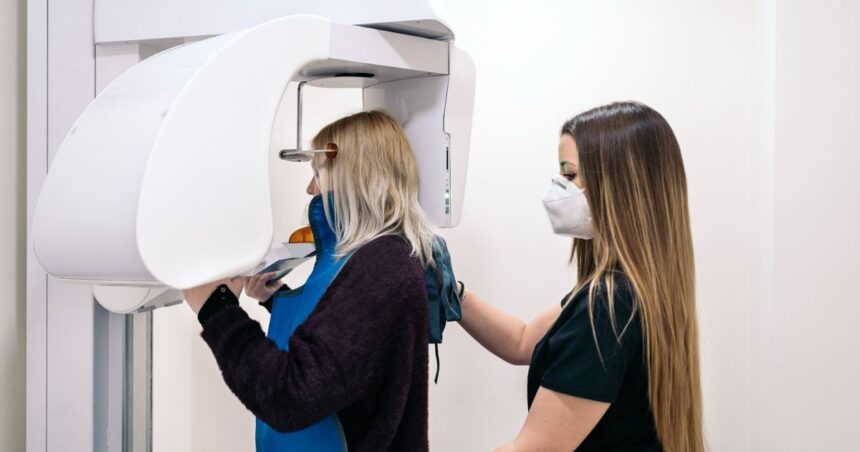Early bone density screening helps patients detect bone loss before fractures occur. This important test measures bone strength and can identify osteoporosis in its early stages. Understanding when to get early bone density screening can protect your bone health and prevent serious complications.
Who Needs Early Bone Density Screening
Most Miami doctors recommend routine bone density screening for women at age 65 and men at age 70. However, many patients need this test much earlier due to specific risk factors:
Women with Early Menopause
Women who experience menopause before age 45 face higher osteoporosis risk. This includes:
- Natural early menopause
- Surgical menopause from hysterectomy with ovary removal
- Chemotherapy-induced menopause
Doctors typically recommend bone density screening within 10 years of menopause onset for these patients.
Patients with Risk-Increasing Medical Conditions
Several health conditions common in Miami patients can weaken bones and require early screening:
- Rheumatoid arthritis
- Type 1 diabetes
- Liver disease
- Kidney disease
- Thyroid disorders (especially hyperthyroidism)
- Celiac disease
- Inflammatory bowel disease
- Lupus
- HIV/AIDS
- Eating disorders
If you have any of these conditions, ask your Miami doctor about early bone density testing, even in your 40s or 50s.
People Taking Bone-Harming Medications
Certain medications can reduce bone density over time:
- Corticosteroids (prednisone, cortisone) used for 3+ months
- Aromatase inhibitors for breast cancer
- Anti-seizure medications
- Some diabetes medications
- Proton pump inhibitors for acid reflux
- Some immunosuppressants
- Aluminum-containing antacids used regularly
Patients taking these medications should discuss early screening with their doctor.
Family History and Lifestyle Factors
Other factors that may prompt early screening include:
- Family history of osteoporosis or hip fractures
- Previous fracture from minor injury
- Low body weight (BMI under 19)
- Smoking
- Heavy alcohol consumption
- Lack of weight-bearing exercise
Many doctors consider these factors when deciding if you need early bone density testing.
What Happens During Bone Density Screening
Bone density screening in Miami is a quick, painless procedure that provides valuable information about your bone health:
The DEXA Scan Procedure
The most common bone density test is dual-energy X-ray absorptiometry (DEXA). Here’s what happens during this test:
- You lie on a padded table while a scanner passes over your body
- No special preparation is needed – you remain fully clothed
- The scanner measures bone density in your hip and spine
- Some tests also check your forearm
- The entire procedure takes 10-15 minutes
- You feel no pain or discomfort
- The radiation exposure is very low – about 1/10 of a chest X-ray
The test measures how many grams of calcium and other minerals are in a section of bone. Higher mineral content means stronger bones.
Other Screening Methods
Some Miami clinics offer additional screening options:
- Peripheral DEXA: A smaller device measures bone density in the finger, wrist, or heel
- Quantitative CT scan: Provides more detailed 3D images but involves more radiation
- Ultrasound: Uses sound waves to check bone density in the heel, shin, or finger
These alternatives may be used for initial screening, but standard DEXA scans remain the gold standard for diagnosis.
Understanding Your Bone Density Results
After your screening, a radiologist interprets the results and shares them with your doctor. Your results include:
T-scores and What They Mean
Your bone density results are reported as T-scores, which compare your bone density to that of a healthy young adult:
- Normal bone density: T-score between +1 and -1
- Low bone density (osteopenia): T-score between -1 and -2.5
- Osteoporosis: T-score of -2.5 or lower
The lower your T-score, the lower your bone density and the higher your fracture risk.
Fracture Risk Assessment
Your doctor may use your bone density results with other factors to calculate your 10-year fracture risk using FRAX (Fracture Risk Assessment Tool). This helps determine if you need treatment.
Factors considered include:
- Age
- Gender
- Weight and height
- Previous fractures
- Parental hip fracture history
- Smoking status
- Alcohol consumption
- Rheumatoid arthritis diagnosis
This assessment helps Miami doctors make personalized treatment recommendations.
Protecting Your Bones Through Early Screening
Early bone density screening allows patients to identify and address bone loss before fractures occur. By understanding your personal risk factors and getting screened at the appropriate time, you can take control of your bone health.
Miami’s sunny climate provides natural vitamin D, but patients need appropriate screening and care to maintain strong bones. Discuss your bone health risk factors with your doctor and follow their recommendations about the right time for your first bone density test.

